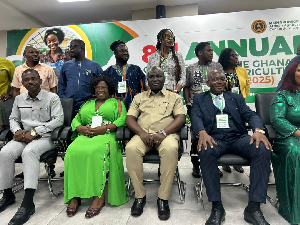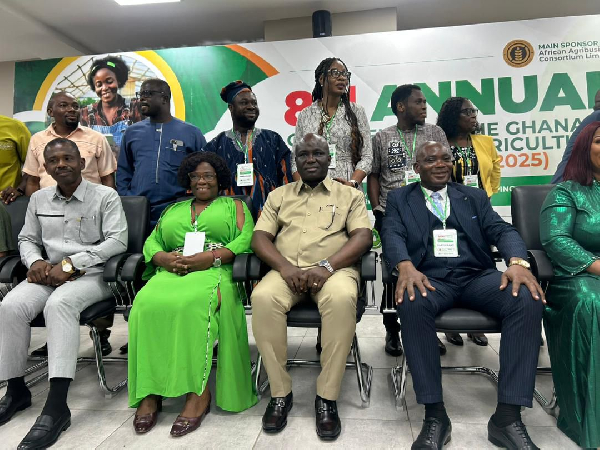 The minister among some of the stakeholders at the event
The minister among some of the stakeholders at the event
The Minister of Food and Agriculture, Eric Opoku, has underscored the urgent need for Ghana to transition from subsistence farming to a dynamic and sustainable agri-food economy capable of competing globally and ensuring national food security.
Addressing the opening session of the 2025 Annual Conference of the Ghana Association of Agricultural Economists (GAAE) at the Kwame Nkrumah University of Science and Technology (KNUST) in Kumasi on Thursday, November 6, 2025, the minister said this year’s theme, “Transforming Agri-Food Systems in Developing Economies through Sustainable Agribusiness Development,” reflects one of the biggest economic opportunities facing Ghana today.
He highlighted the central role agriculture continues to play in Ghana’s economy, contributing about 20 percent to the national GDP and employing one-third of the workforce, with more than 70 percent of rural households depending on the sector for their livelihoods.
Despite this contribution, the minister lamented persistent productivity challenges, rising food imports and significant post-harvest losses amounting to as much as 30 percent of total output.
Ghana’s food import bill currently exceeds US$3 billion annually, largely driven by rice, poultry, and processed food imports.
“The challenge before us is not simply to produce more food but to transform our entire agri-food system ensuring that the process is profitable, inclusive and environmentally responsible,” he emphasised.
Opoku noted that Africa’s food and agribusiness market is projected to exceed US$1 trillion by 2030, an opportunity that can only be realized through strong value chains, innovation and investment in sustainable agribusiness.
The minister outlined two key government policies aimed at driving the transformation agenda the Feed Ghana Policy and the 24-Hour Economy Policy.
The Feed Ghana Policy, he said, seeks to strengthen domestic food production through improved seed access, irrigation expansion, mechanization, post-harvest infrastructure and agro-processing.
Touching on the 24-Hour Economy initiative, the minister explained that the policy is designed to boost productivity by supporting continuous operations in food logistics, processing, and storage thereby reducing delays, improving market efficiency and creating more jobs.
Opoku called on agricultural economists and researchers to partner with the government by providing evidence-based frameworks for investment and policy reforms while bridging the gap between research and industry.
He also emphasised the strategic role of Ghana’s youthful population in modernizing agriculture through digital technologies, innovation hubs and agribusiness entrepreneurship.
The minister expressed concern about the worsening impacts of climate change on agricultural production, citing significant crop losses recorded in recent years.
He assured that the government is prioritizing climate-smart agriculture, efficient water management and soil health restoration to build a more resilient sector.
He appealed for stronger collaboration among government institutions, the private sector, investors, development partners and academia in driving agri-food transformation.
“This conference is more than an academic event it is a call to action. The decisions we make today will shape the food systems of tomorrow,” he stated.
Opoku thanked the leadership of the GAAE for providing the platform and expressed optimism that discussions from the conference will contribute positively to Ghana’s agricultural growth agenda.
Watch the promo to GhanaWeb’s latest documentary, which uncovers the evolution of ‘kayamata,’ an exploitative practice fueled by love charms and manipulation, titled, “The Dark Side of Kayamata,’ below:
The wait is over! The GhanaWeb Excellence Awards 2025 is officially launched. Let’s Celebrate impact, innovation and excellence across Ghana.
Who deserves to be honoured this year?
Nominate now 👉 https://ghanaweb.com/ghanaexcellenceawards/nominate
